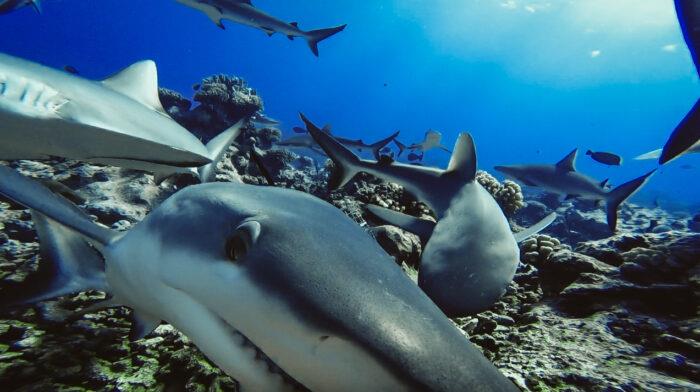
Sharks almost gone from many reefs
by ARC Centre of Excellence for Coral Reef Studies 25 Jul 2020 10:38 UTC

Sharks are functionally extinct on nearly 20 percent of the world's reefs © Global FinPrint
A massive global study of the world's reefs has found sharks are 'functionally extinct' on nearly one in five of the reefs surveyed.
James Cook University's Professor Colin Simpfendorfer was one of the scientists who took part in the study, published today in Nature by the Global FinPrint organisation. He said of the 371 reefs surveyed in 58 countries, sharks were rarely seen on close to 20 percent of those reefs.
"This doesn't mean there are never any sharks on these reefs, but what it does mean is that they are 'functionally extinct'—they are not playing their normal role in the ecosystem," said Prof Simpfendorfer.
He said almost no sharks were detected on any of the 69 reefs of six nations: the Dominican Republic, the French West Indies, Kenya, Vietnam, the Windward Dutch Antilles and Qatar.
"In these countries, only three sharks were observed during more than 800 survey hours," said Prof Simpfendorfer.
Dr Demian Chapman, Global FinPrint co-lead and Associate Professor in the Department of Biological Sciences and Institute of Environment at Florida International University, said it's clear the central problem is the intersection between high human population densities, destructive fishing practices, and poor governance.
"We found that robust shark populations can exist alongside people when those people have the will, the means, and a plan to take conservation action," said Dr Chapman.
Prof Simpfendorfer said it was encouraging that Australia was among the best nations at protecting shark populations and ensuring they played their proper role in the environment.
"We're up there along with such nations as the Federated States of Micronesia, French Polynesia and the US. These nations reflect key attributes that were found to be associated with higher populations of sharks: being generally well-governed, and either banning all shark fishing or having strong, science-based management limiting how many sharks can be caught," he said.
Jody Allen, co-founder and chair of the Paul G. Allen Family Foundation which backs the Global FinPrint project, said the results exposed a tragic loss of sharks from many of the world's reefs, but also gave some hope.
"The data collected from the first-ever worldwide survey of sharks on coral reefs can guide meaningful, long-term conservation plans for protecting the reef sharks that remain," she said.
More than 100 authors contributed to the study, including three from the ARC Centre of Excellence for Coral Reef Studies: Professor Joshua Cinner, Stacy Bierwagen and Jessica Cramp.
Paper
MacNeil et al. (2020). 'Global Status and Conservation Potential of Reef Sharks'. Nature. DOI: 0.1038/s41586-020-2519-y